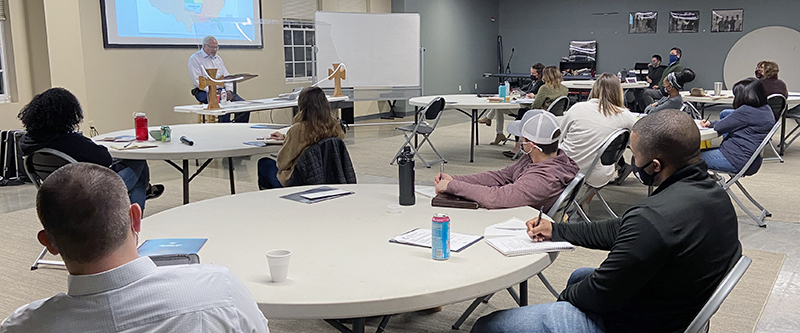
Carl Ellis, Provost’s Professor of Theology and Culture at Reformed Theological Seminary, teaches Minority Church History for Memphis City Seminary in February 2021 at Second Presbyterian Church.
Starting a new seminary during a pandemic would not appear to be a wise thing to do. But when the purpose and strategy of Memphis City Seminary (MCS) are taken into consideration, it makes total sense. A ministry of Second Presbyterian Church in Memphis, MCS launched in February 2020 as the COVID-19 pandemic began sweeping across the United States.
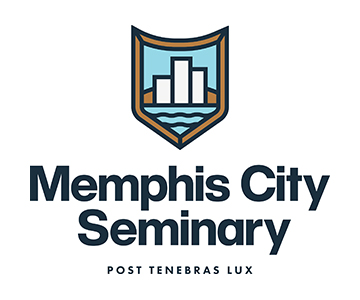 The organizers weren’t sure of the seminary’s immediate future at the time, recalled Taylor Tollison, MCS Director of Operations, who also serves as Domestic Outreach Coordinator for Second Presbyterian Church. Yet in looking back, he said the school’s flexible, local-oriented model—plus low tuition cost of $100 per credit hour—turned out to be “a great approach” during a time of restrictions on travel and in-person gatherings.
The organizers weren’t sure of the seminary’s immediate future at the time, recalled Taylor Tollison, MCS Director of Operations, who also serves as Domestic Outreach Coordinator for Second Presbyterian Church. Yet in looking back, he said the school’s flexible, local-oriented model—plus low tuition cost of $100 per credit hour—turned out to be “a great approach” during a time of restrictions on travel and in-person gatherings.
He explained that from the beginning, the seminary was designed to provide not only flexibility in academic preparation for ministry, but also a focus on “place-based” education. That means that MCS, training students for ministry in the urban landscape of Memphis, would ensure its students would gain an understanding of how their biblical and theological studies would be applied in their local context. Specifically, recent U.S. Census data shows that the Memphis metro area of more than 5 million is nearly 48 percent African American and only 43 percent non-Hispanic white.
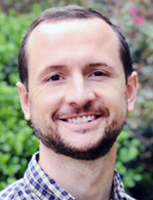
Taylor Tollison
“MCS offers a distinct curriculum that is designed to prepare pastors for the Memphis context and the surrounding region,” Tollison said. “We want to learn from those voices in theological education that are often underrepresented by offering specific courses and requiring specialized reading.”
Tollison noted that a key value of MCS is that the seminary views its students as more than just “academic thinkers.”
“Our hope is that our students will receive a holistic and comprehensive theological education that equips them in four key areas: knowledge, character, skills and vision,” he said. “Our aim is not merely to transfer information to the mind, but to take part in the full-orbed formation of Christian leaders. We believe the demands of gospel ministry require the whole person to be equipped—not merely the mind.”
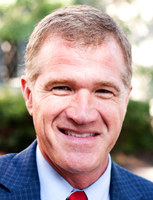
George Robertson
George Robertson, Senior Pastor of Second Presbyterian Church and MCS Academic Dean, said the school’s faculty are “pastoral scholars” who integrate education with practical ministry.
“We are making our experience and the best of biblical and theological scholarship available and affordable to Christ-centered leaders in Memphis,” he said.
Brian Lewis, Second Presbyterian Church’s Director of Domestic Outreach, serves as MSC’s Executive Director. He said the seminary is “well on its way” to providing affordable, high-level education for ministers who do not want to leave Memphis to receive their theological education.
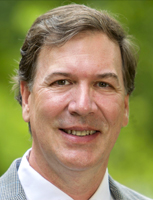
Brian Lewis
“We are attracting bivocational workers and many people of color,” Lewis said. “We strive to be very multi-cultural, which mirrors our Memphis culture. We believe we will also steadily attract students regionally and nationally, because Memphis has world-wide appeal.”
Rufus Smith, Senior Pastor of Hope Presbyterian Church in Memphis and a member of MCS’ Board, said that he often promotes the seminary’s “affordability, accessibility, and action-oriented training for gospel ministry in churches, non-profits, and the marketplace.”
Tollison said MCS is officially “authorized” by the State of Tennessee—which legitimatizes it as a school of higher learning—and is pursing official accreditation through the Association for Biblical Higher Education and the Association of Reformed Theological Seminaries. He hopes MSC will receive full accreditation in three to five years.
The groundwork for MSC started in 2006 when Second Presbyterian Church began to envision what an urban seminary for Memphis might look like, with the ultimate goal to offer an entire Master of Divinity degree locally. From 2006 to 2009, a venue for offering seminary education was through the Memphis Center for Urban Studies initiative. In 2009, Second Presbyterian Church began hosting a Reformed Theological Seminary extension site.
Limitations Lead to Vision
For the next 10 years, Lewis and his wife, Joanne, directed the RTS extension. Students could begin their seminary degree in Memphis, but were only eligible for a Certificate of Biblical Studies (CBS) upon the completion of 29 hours. After 29 hours students could complete an MA degree online, or for other degrees were required to transfer to a degree-granting seminary location to complete their coursework.
To bridge this gap in local seminary education, MCS was launched in November 2019 as a degree-granting seminary for both Master of Arts in Biblical Studies and Master of Divinity degrees. Twenty degree-seeking RTS students joined 30 other students to bring the initial enrollment to 50.
Spring 2021 enrollment has grown to 60 students—35 men and 25 women—with 16 of those being minority students. Local churches represented by MCS students include Downtown Church, Fellowship Memphis, First Evangelical Church, Hope Church, Second Presbyterian Church, and The Avenue Community Church.
“One of the things I love most about my job,” said Joanne Lewis, MCS Director of Enrollment, “is to see students in our classroom who have dreamed, prayed, and waited for an opportunity to pursue their theological education but until now were unable to do so.”
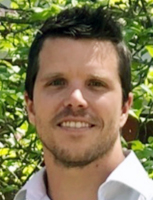
Braden Tyler
Braden Tyler, a teacher and soccer coach at a private Christian school in inner-city Memphis, is one of those students.
“I am 31 years old and have wanted to do seminary ever since becoming a believer [while] in college,” Tyler said. “However, college debt, getting married, and having children kept me from pursuing this. All the seminaries that I wanted to attend were too expensive and not located in the city of Memphis. I could do online seminary, but it would be too expensive for me and it would be a lonely road.”
He noted that relocating to an in-resident seminary would require quitting his job, moving to a new city, and having his wife get a job in order for him to be a full-time student.
“Unsatisfactory options like this kept putting seminary on the back burner,” Tyler said. “Then along came MCS—an affordable, flexible, and local seminary that could give me the high quality, biblical education that I wanted. I could keep my job and keep my family in our city. Christians shouldn’t have to pay thousands upon thousands of dollars and have to leave the context of their city in order to get a seminary degree. I have talked to many people and it seems that seminaries like this could be the future for the church.”
He said that after he receives a degree from MSC, his goal is to continue his education by pursuing a PhD to teach in a seminary or become a pastor.
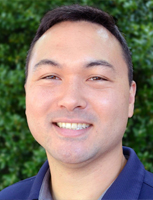
Denny Catalano
Denny Catalano, director of Campus Outreach in Memphis, said MSC is “a great complement” to his work.
“I chose Memphis City Seminary because I wanted to grow in my knowledge of God, in my character, and in my skills to more effectively reach the lost and shepherd my team,” he said. “We serve a very broad ethnic and cultural demographic, so I was looking for something that would give me a broad and thorough understanding of God and how He has worked throughout history among all nations. I count it a great privilege to be able to learn from some of the best scholars out there while being able to collaborate and learn alongside people ministering in a broad array of contexts.”
Bradley Morrow, Second Presbyterian Church’s Recreation Coordinator, said MSC makes a seminary education financially possible for him.
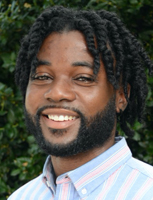
Bradley Morrow
“MCS has allowed me to gain a sound theological education that is affordable and allows me to work a full-time job where I am able to apply what I am learning in class to my ministry in the city,” he said. “MCS is equipping me to read, study, and teach the Scriptures in a way that reveals Jesus and proclaims the gospel as good news to every ZIP code in the city.”
Tyler agreed, adding that is it is a “big advantage” taking seminary classes alongside people from the city where you live.
“This is very unifying for a city and for churches,” Tyler said. “The next spiritual leaders of the community are people who have been trained in the same seminary and are friends with each other. This seminary can provide classes that fit the needs of Memphis and can better train leaders to impact this city.”
For more information on Memphis City Seminary, see www.memphiscityseminary.org
by Tim Yarbrough
EPConnection correspondent
